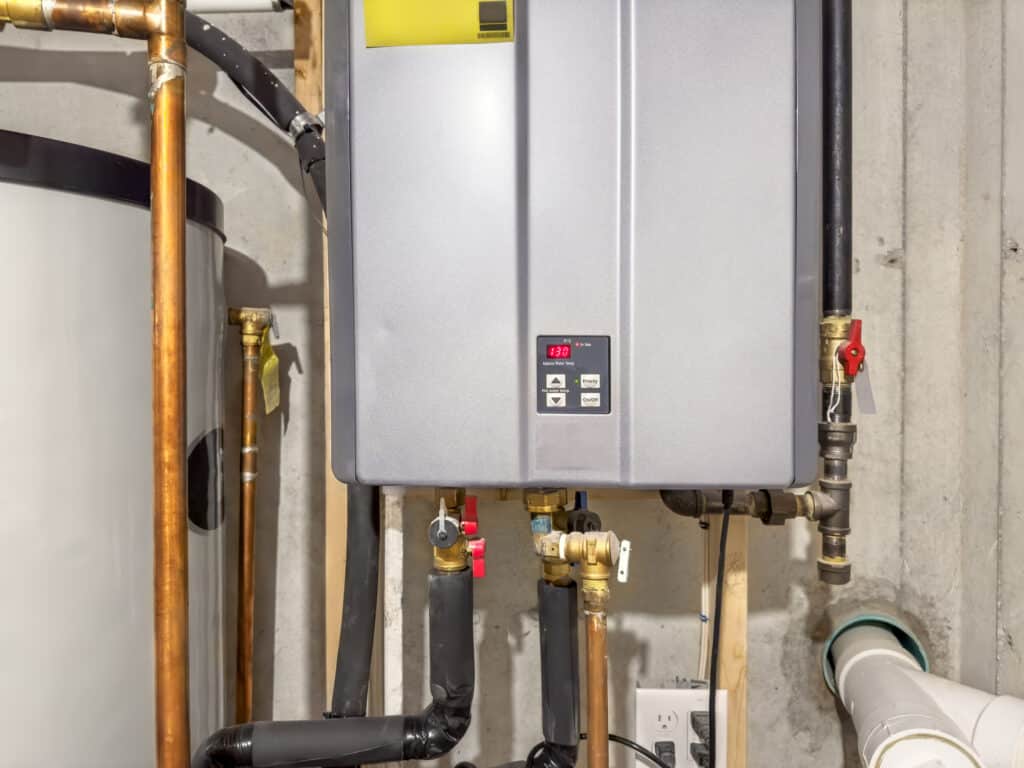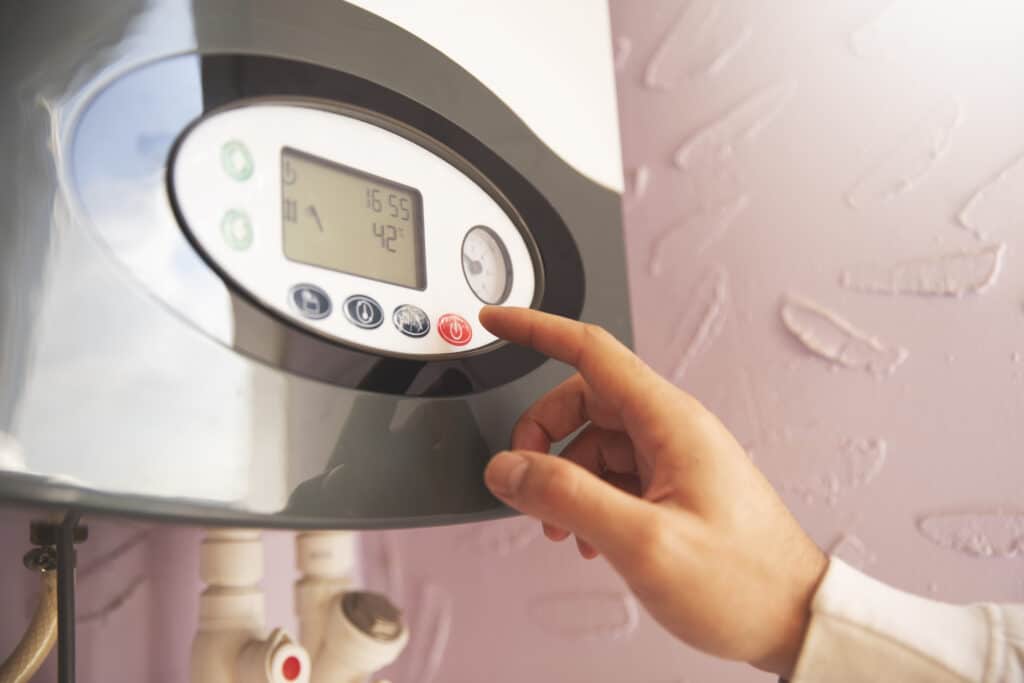
The Benefits of Upgrading to a Tankless Water Heater in 2025
A tankless water heater is a modern, energy-efficient solution that provides hot water on demand without storing it in a bulky tank. Unlike traditional water heaters that continuously heat a tank full of water, tankless models only heat water when needed, reducing energy consumption and offering an endless supply of hot water.
As homeowners in Conway, SC, look for ways to improve energy efficiency and reduce utility costs, 2025 is an excellent time to upgrade. Advancements in tankless water heater technology have made these systems more affordable, efficient, and eco-friendly. With potential tax incentives and rebates available for energy-efficient home improvements, upgrading now can bring long-term savings.
This guide explores the key benefits of switching to a tankless water heater, from energy efficiency to space savings and increased home value. Whether you’re building a new home or replacing an outdated water heater, understanding these advantages will help you make an informed decision.
What Is a Tankless Water Heater?
A tankless water heater is a modern alternative to traditional storage water heaters. Instead of storing and continuously heating a large tank of water, it heats water only when needed. This process happens as cold water flows through high-powered burners or electric heating elements, ensuring hot water is available instantly. Because water is heated on demand, there is no risk of running out of hot water like with a conventional system.
Tankless systems come in two main types: gas-powered and electric models. Gas-powered units use a burner to heat water quickly, making them ideal for larger households that use multiple appliances at once. Electric models use heating elements and are typically more compact, making them a great choice for smaller homes or specific applications, such as a guest bathroom or a remote outdoor sink. Many newer models feature modulating burners or advanced heating coils, which adjust the energy use based on demand, further improving efficiency.
One of the biggest advantages of these heaters in 2025 is their improved efficiency and smart technology. Many models now include Wi-Fi connectivity, digital temperature controls, and self-cleaning functions. These features allow homeowners to monitor energy usage, adjust temperature settings remotely, and reduce maintenance needs. With rising energy costs and an increasing demand for eco-friendly solutions, upgrading to a tankless water heater is a smart investment for homeowners in Conway, SC.
Compared to traditional units, tankless models provide a more reliable and energy-efficient solution, eliminating standby heat loss and reducing utility bills. Their ability to supply hot water only when needed makes them a preferred choice for modern homes. Whether you’re looking to upgrade for better performance, lower costs, or environmental benefits, a tankless water heater is a solution worth considering.

Energy Efficiency and Cost Savings
One of the biggest reasons homeowners in Conway, SC, are switching to a tankless water heater is the significant improvement in energy efficiency. Unlike traditional models that keep a large tank of water heated 24/7, a tankless system heats water only when needed. This on-demand heating process eliminates standby energy loss, making it far more efficient.
According to the U.S. Department of Energy, a tankless water heater can be 24% to 34% more energy-efficient for homes that use 41 gallons or less of hot water per day. For larger households that use more, savings can still be around 8% to 14% compared to traditional water heaters. Over time, these savings add up, reducing monthly energy bills and making up for the initial investment of upgrading.
Additionally, many tankless water heaters come with an Energy Star certification, meaning they meet strict energy efficiency standards. Some models even include smart sensors and adaptive heating technology, which further optimize performance. With rising utility costs, homeowners can benefit from a system that only uses energy when necessary.
Another financial advantage is the potential for rebates and tax incentives. In 2025, government programs and local utility providers may offer credits for installing energy-efficient appliances. This can lower the upfront cost of a tankless water heater, making it a more attractive investment. Before purchasing, homeowners should check with local energy providers or consult professionals like Benjamin Franklin Plumbing of Myrtle Beach, SC, to learn about available incentives.
By cutting energy costs, reducing waste, and qualifying for rebates, upgrading to a tankless water heater is a decision that benefits both the environment and your wallet.
Endless Hot Water Supply
One of the most appealing benefits of a tankless water heater is its ability to provide endless hot water. Unlike traditional storage tanks that can run out of hot water after heavy use, a tankless system heats water on demand. This means that as long as there is a water supply, your home will always have hot water available.
For families in Conway, SC, this is especially useful when multiple people need hot water at the same time. Whether you’re taking a shower while the dishwasher is running or filling a bathtub after doing laundry, a tankless water heater ensures there’s no waiting for the tank to refill and reheat. This can be a game-changer for large households or homes with high water usage.
Another advantage is consistent water temperature. Traditional water heaters can struggle to keep temperatures stable when demand is high, sometimes leading to sudden cold bursts. Tankless models, however, use advanced heating technology to maintain a steady and reliable water temperature. Many units also come with digital controls that allow homeowners to adjust the water temperature to their preference.
For homes that need to run multiple hot water appliances simultaneously, some tankless systems come with the option to install multiple units or a recirculating system. This ensures an even distribution of hot water throughout the home. By upgrading to a tankless water heater, homeowners can say goodbye to cold showers and enjoy a continuous, comfortable supply of hot water whenever they need it.
Space-Saving and Compact Design
A tankless water heater is not only efficient but also space-saving. Traditional water heaters come with large storage tanks that can take up significant space in a home, often requiring a dedicated utility closet, basement, or garage area. In contrast, tankless models have a compact, wall-mounted design, freeing up valuable square footage.
For homeowners in Conway, SC, where maximizing space is important, switching to a tankless water heater can make a noticeable difference. These systems can be installed in small utility rooms, under sinks, or even outdoors, depending on the model. This flexibility allows homeowners to use the freed-up space for additional storage or other essential home features.
Another advantage is the ability to install multiple smaller units throughout the home. For example, homeowners can place one unit near bathrooms and another in the kitchen for optimized hot water distribution. This is particularly useful for large homes or properties with multiple floors, ensuring instant hot water at every tap without long wait times.
Additionally, tankless water heaters offer a sleek, modern design that blends well with contemporary home layouts. Unlike bulky storage tanks that can be an eyesore, a tankless system is discreet and can be hidden away behind cabinetry or mounted in an inconspicuous location.
For homeowners looking to upgrade their water heating system without sacrificing space, a tankless water heater provides a streamlined, efficient, and modern solution that enhances both function and home aesthetics.
Longer Lifespan and Durability
Investing in a tankless water heater not only improves efficiency but also ensures a longer-lasting system. Traditional water heaters with storage tanks typically have a lifespan of 8 to 12 years, depending on usage and maintenance. In contrast, a tankless water heater can last 20 years or more with proper care, making it a more durable and cost-effective solution in the long run.
One key reason for this extended lifespan is the absence of a storage tank. Traditional systems continuously store water, which can lead to corrosion, rust, and sediment buildup over time. These issues often reduce efficiency and lead to leaks or system failures. A tankless system, however, heats water only when needed, reducing the risk of internal damage and extending its operational life.
Many modern tankless water heaters also feature self-cleaning mechanisms and advanced filtration, helping prevent mineral buildup from hard water. In areas like Conway, SC, where water quality can impact appliance longevity, this feature can make a significant difference in reducing maintenance needs.
Additionally, manufacturers often back tankless water heaters with longer warranties compared to traditional models. While tank-based systems typically come with 6-year warranties, tankless models often offer 10- to 15-year coverage on key components. This added protection gives homeowners peace of mind, knowing their investment is built to last.
By choosing a tankless water heater, homeowners can enjoy a reliable, long-lasting hot water solution while reducing the need for frequent replacements and costly repairs. The durability of these systems makes them a smart investment for the future.
Environmental Benefits
Upgrading to an energy-efficient water heating system isn’t just a smart financial move, it’s also an eco-friendly choice. Modern units help reduce energy waste, water consumption, and carbon emissions, making them a great option for homeowners in Conway, SC, who want to lower their environmental impact.
One of the biggest environmental advantages of going tank-free is improved energy efficiency. Traditional models continuously heat and reheat stored water, even when it’s not in use, leading to unnecessary energy waste. In contrast, on-demand systems heat water only when needed, significantly reducing overall consumption. According to the U.S. Department of Energy, this efficiency can lower a household’s carbon footprint by reducing fuel or electricity usage by up to 34%.
Water conservation is another key benefit. With older systems, people often let water run while waiting for it to warm up. Instant heating technology eliminates this issue, reducing the amount of wasted water. Some models also feature recirculating pumps, helping maintain hot water in the pipes and further minimizing unnecessary use.
Additionally, these units contribute less waste to landfills. Since they last nearly twice as long as conventional models, fewer replacements are needed over time. Many manufacturers also design their systems with recyclable parts, further reducing environmental impact.
For homeowners looking to live more sustainably, an efficient, on-demand water heating system provides a way to reduce energy waste, conserve water, and support a greener future. By upgrading, families can enjoy the convenience of endless hot water while also making a positive impact on the environment.
Increased Home Value and Modern Appeal
Upgrading to a tankless water heater isn’t just about convenience and efficiency, it can also boost your home’s resale value. Many buyers today prioritize energy-efficient upgrades, and having an advanced water heating system in place makes your property more attractive in the real estate market.
One of the main reasons this upgrade adds value is its long-term cost savings. Homebuyers appreciate features that lower utility bills, and an on-demand water heating system does exactly that by reducing energy consumption. Additionally, since these units have a longer lifespan than traditional models, potential buyers see them as a low-maintenance, durable investment.
Another appealing factor is modern home design compatibility. Traditional storage tanks can take up valuable space, while compact, wall-mounted models free up room for storage or additional appliances. This is especially beneficial in Conway, SC, where homeowners may want to maximize living areas in smaller homes, condos, or townhouses.
In addition to functionality, smart technology integration is another selling point. Many of the latest models feature Wi-Fi connectivity, allowing homeowners to adjust water temperature remotely and track energy usage. As smart home technology continues to gain popularity, having an advanced water heating system that integrates with home automation platforms makes a property stand out.
Whether you’re planning to sell soon or simply want to future-proof your home, installing a tankless water heater enhances both efficiency and resale value. Buyers are looking for modern, eco-friendly upgrades, and an energy-efficient water heating system checks all the right boxes.
Professional Installation Matters
Upgrading to a modern water heating system offers numerous benefits, but proper installation is essential to maximize efficiency, performance, and safety. Unlike traditional storage tanks, which are relatively straightforward to install, on-demand systems require precise sizing, specialized venting (for gas models), and expert electrical or gas line connections. Ensuring the unit is installed correctly helps homeowners get the most out of their investment while avoiding potential issues down the line.
Proper Sizing Ensures Optimal Performance
One of the key reasons to hire a professional is system sizing. If a unit is too small, it may not produce enough hot water to meet household demand, especially in homes with multiple bathrooms or high-usage appliances. On the other hand, an oversized unit can lead to unnecessary energy consumption, increasing utility costs without providing additional benefits. A licensed plumber, such as the team at Benjamin Franklin Plumbing of Myrtle Beach, SC, will assess water usage patterns and recommend the ideal model based on factors such as the number of occupants, appliances, and peak water demand.
Gas and Electrical Considerations
Proper gas or electrical connections are crucial for safe and efficient operation. Gas-powered models need adequate ventilation to prevent carbon monoxide buildup, and improper installation can lead to serious safety risks. Electric systems may require upgraded wiring or circuit modifications to handle the increased power demand. A professional ensures the unit is properly connected, meets all safety codes, and functions efficiently from day one.
Access to Rebates and Incentives
Another advantage of professional installation is the potential for rebates and tax incentives. Many energy efficiency programs require certified installation to qualify for government incentives. A licensed plumber ensures compliance with local building codes, helping homeowners take full advantage of available savings. Additionally, a properly installed system is less likely to experience breakdowns, reducing long-term maintenance costs.

FAQs About Tankless Water Heaters
1. How much maintenance does an on-demand water heater require?
These systems need less maintenance than traditional models, but routine care is still important. Flushing the unit once a year helps remove mineral buildup, especially in areas with hard water. Many modern designs feature self-cleaning functions, but professional servicing ensures long-term efficiency.
2. Can an energy-efficient system supply hot water to an entire home?
Yes, as long as it’s properly sized for household demand. A professional plumber can assess the home’s water usage and recommend the right unit. For larger homes, multiple units or a recirculating system may provide the best solution.
3. Is a gas or electric model better?
The choice depends on home setup and energy costs. Gas-powered models generally provide higher flow rates, making them ideal for homes with high water demand. Electric units are more compact and easier to install, but may require an upgraded electrical system in older homes.
4. How long does installation take?
A standard installation usually takes 4 to 8 hours, but this varies depending on the home’s existing plumbing and energy source. If new gas lines or upgraded electrical wiring are needed, installation may take longer.
5. Are there any government incentives for upgrading in 2025?
Yes! Homeowners may qualify for federal tax credits, utility rebates, or state incentives for installing an energy-efficient system. It’s recommended to check with local energy providers or consult a professional, like Benjamin Franklin Plumbing of Myrtle Beach, SC, to learn about available savings.

 843.213.6611
843.213.6611